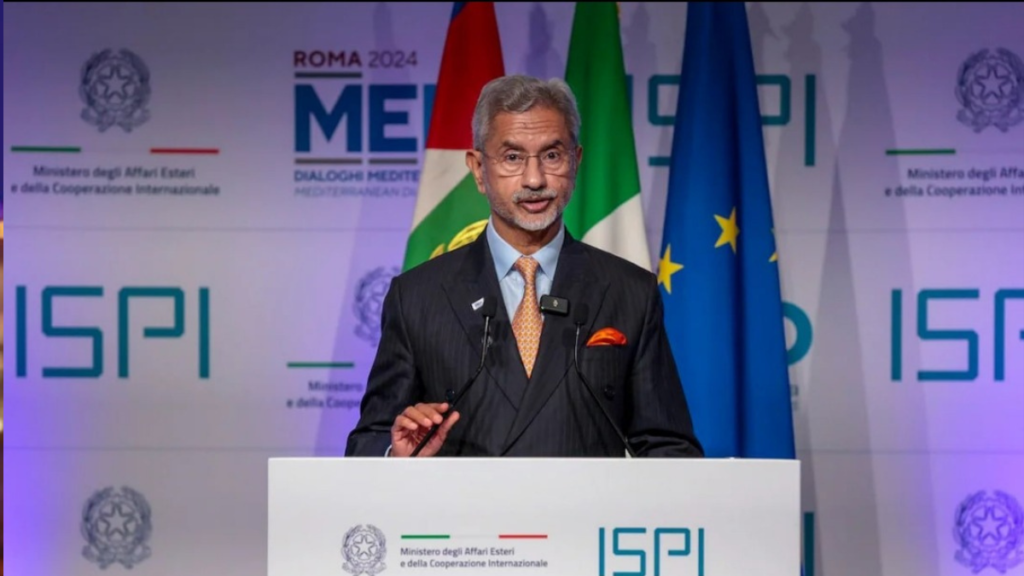India supports an immediate ceasefire in West Asia and favours a two-state solution in the long-term, External Affairs Minister S Jaishankar said on Monday as he condemned terrorism, hostage-taking and civilian casualties in military operations.Speaking at the 10th edition of the MED Mediterranean Dialogue in Rome, Mr Jaishankar said that the situation in West Asia is deeply concerning, both for what has happened and what may still come.”India unequivocally condemns terrorism and hostage-taking. It also regards large-scale civilian casualties in military operations to be unacceptable. International humanitarian law cannot be disregarded,” he said.
“In immediate terms, we should all support a ceasefire. India has also extended relief directly and through UNRWA. In the longer term, it is imperative that the future of the Palestinian people be addressed. India favours a two-State solution,” he said.Voicing concerns over the widening of the conflict in West Asia, Mr Jaishankar said that India has been in regular touch with both Israel and Iran at the highest levels to advocate restraint and enhance communication.
“Where Lebanon is concerned, there is an Indian contingent like Italy, that is part of UNIFIL. With regard to the Gulf of Aden and the northern Arabian Sea, Indian naval ships have been deployed since last year to protect commercial shipping. Given our capacity to engage various parties, we are always willing to contribute meaningfully to any international diplomatic endeavours, ” he said.United Nations Interim Force in South Lebanon (UNIFIL) has around 10,500 peacekeepers drawn from 50 troop-contributing countries. India has more than 900 people as part of UNIFIL in Lebanon.
Noting that the Ukraine-Russia conflict is in its third year, Mr Jaishankar said that the continuation of this conflict has serious destabilizing consequences, including for the Mediterranean.”What is clear is that no solution is going to emerge from the battlefield. India has consistently held the view that disputes in this era cannot be settled by war. There must be a return to dialogue and diplomacy; the sooner the better. This is a widespread sentiment in the world today; especially in the Global South,” he asserted.
Since June, Prime Minister Narendra Modi has personally engaged leaders of both Russia and Ukraine. This has included his visiting Moscow and Kyiv, he said.”Our senior officials remain in continuous touch. We firmly believe that those who have the ability to explore finding common ground must step up to that responsibility,” the minister said.
Talking about the growing challenges of these two major conflicts, he said the world is experiencing severe stress.”Two major conflicts are underway. Supply chains are insecure. Connectivity, especially maritime, stands disrupted. Climate events are more extreme and frequent. And the Covid pandemic has left deep scars,” he said.Mr Jaishankar said the Mediterranean presents both opportunities and risks in an uncertain and volatile world. “Beyond extrapolating current trends, the new element of our relationship will be connectivity,” he said.He said that the conflict underway currently in West Asia has undoubtedly been a major complication. But the IMEEC (India-Middle East-Europe Economic Corridor), which can be a game changer, is proceeding ahead on the Eastern side, especially between India, UAE and Saudi Arabia, he added.He also talked about the I2U2 grouping of India, Israel, UAE and the US, saying it is expected to be more active in times to come.Mr Jaishankar said India’s trade with the Gulf alone is in the range of USD 160 to 180 billion annually. The rest of MENA (Middle East and North Africa) adds about another USD 20 billion. More than nine million Indians live and work in West Asia.”Whether it is energy, technology, industrial projects or services, we have big stakes. It is also a region to which we are connected in history, culture and security,” he said.Talking about opportunities, Mr Jaishankar said a closer and stronger relationship between India and the Mediterranean will serve them well.”We are today on the threshold of a new era. It is one of re-globalizing, re-balancing and multi-polarity. It is also a more technology-centred future, with a premium on the mobility of talent and greener growth. Opportunities in this world are as indivisible as anxieties. A closer and stronger relationship between India and the Mediterranean will serve both of us well,” he said.”Our annual trade with the Mediterranean nations is about USD 80 billion. We have a diaspora here of 460,000. About 40% of that in Italy. Our key interests are in fertilizers, energy, water technology, diamonds, defence and cyber,” he said.Mr Jaishankar said that India has significant projects underway as airports, ports, railways, steel, green hydrogen, phosphates and submarine cables.”Our political relations with the Mediterranean are strong and our defence collaboration is growing, including more exercises and exchanges,” he added.Mr Jaishankar, who arrived here on Sunday on a three-day visit, will participate in the Outreach session of the G7 Foreign Ministers’ Meeting in Fiuggi, where India has been invited as a guest country.

